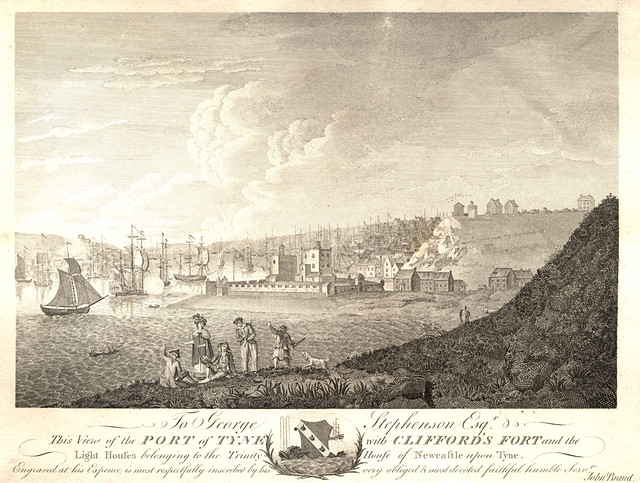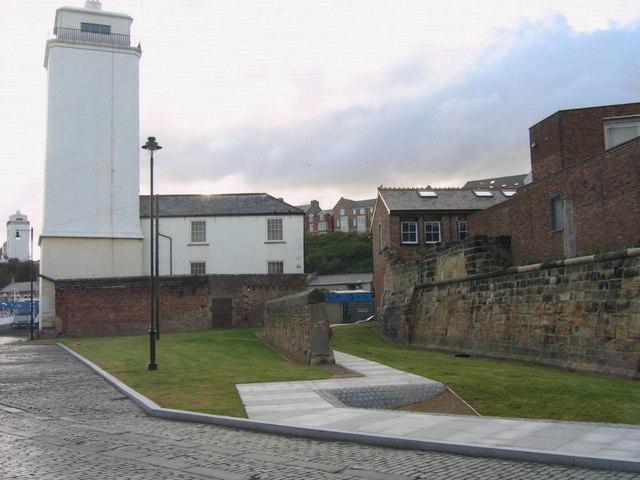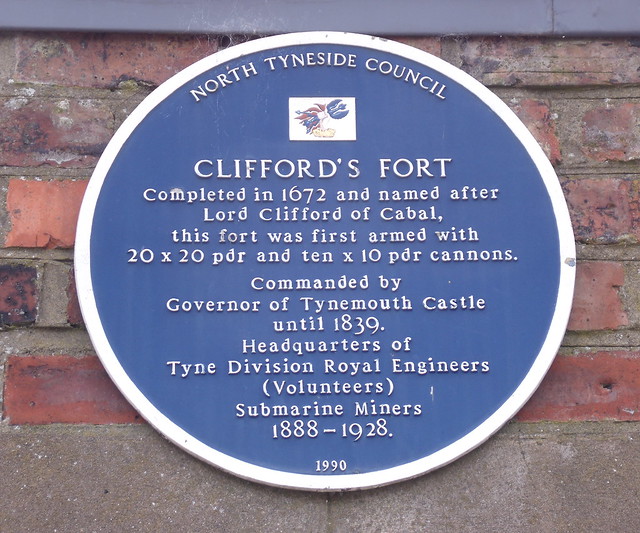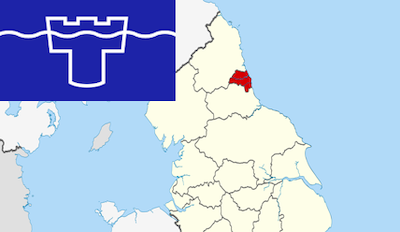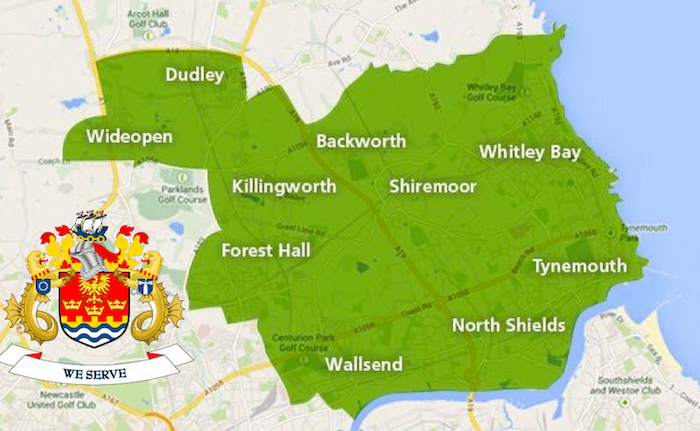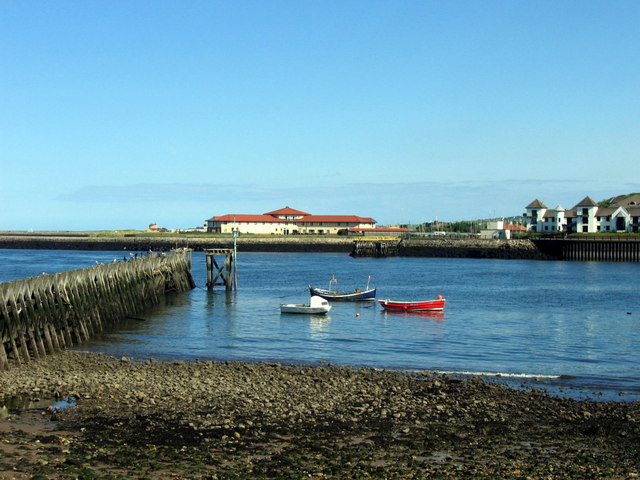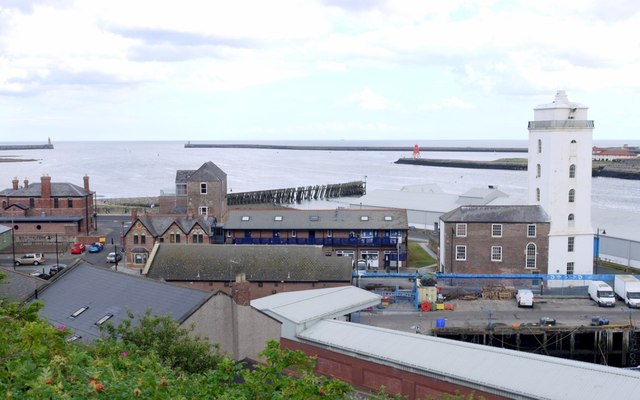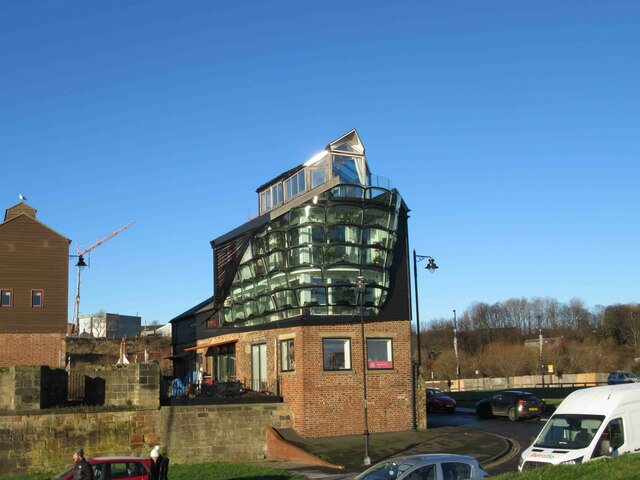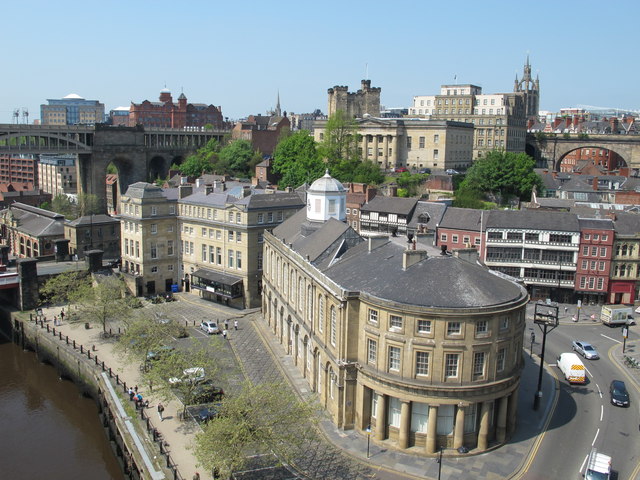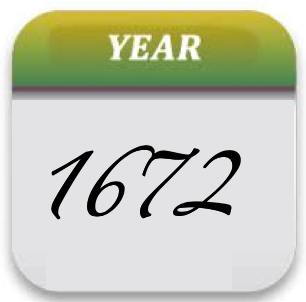Topics > Tyne and Wear > North Tyneside > North Shields > North Shields Fish Quay > Clifford's Fort
Clifford's Fort
 Clifford's Fort was a gun battery and military barracks built to defend the mouth of the River Tyne, at the east of the Fish Quay area of North Shields. The fort was built in 1672, on the site of earlier defences, during the Anglo-Dutch Wars. It was named after Thomas Clifford, who was Lord High Treasurer at that time. The fort was used as a gun battery until 1881, but had become obsolete after the building of Tynemouth pier. Then, in 1888 the fort became the headquarters of the Tyne Division Royal Engineers (Volunteers) Submarine Miners, responsible for laying explosive mines as port defences. Clifford's Fort stopped being used as a military base in 1928. Today Clifford's Fort is a Scheduled Ancient Monument; surviving features include the south/east facing walls, and west walls (both sections of wall are Grade II* listed on the National Heritage List for England), the Smoke house (a former C19th barracks building; Grade II listed), and former mine store buildings. Also on the site is the Old Low Light, built in 1727 (Grade II listed).
Clifford's Fort was a gun battery and military barracks built to defend the mouth of the River Tyne, at the east of the Fish Quay area of North Shields. The fort was built in 1672, on the site of earlier defences, during the Anglo-Dutch Wars. It was named after Thomas Clifford, who was Lord High Treasurer at that time. The fort was used as a gun battery until 1881, but had become obsolete after the building of Tynemouth pier. Then, in 1888 the fort became the headquarters of the Tyne Division Royal Engineers (Volunteers) Submarine Miners, responsible for laying explosive mines as port defences. Clifford's Fort stopped being used as a military base in 1928. Today Clifford's Fort is a Scheduled Ancient Monument; surviving features include the south/east facing walls, and west walls (both sections of wall are Grade II* listed on the National Heritage List for England), the Smoke house (a former C19th barracks building; Grade II listed), and former mine store buildings. Also on the site is the Old Low Light, built in 1727 (Grade II listed).Clifford's Fort was a defensive gun battery established near the mouth of the Tyne during the Anglo-Dutch Wars in the 17th century. It subsequently served as a submarine mining depot and survives today as a Scheduled Ancient Monument in the historic Fish Quay area of North Shields, Tyne and Wear, in North East England.
History
17th century
The fort was built in 1672 at the start of the Third Dutch War. An earlier fort had been established on or near the site some thirty years earlier (a somewhat temporary structure consisting of gabions: "baskets filled with sand and mortar, with guns placed between the baskets") but this had been destroyed in action in 1644. (It was paired with a similar fort on the south bank of the river, which had been established by the Marquis of Newcastle in 1642.)
Named after Lord Clifford of Chudleigh ('Clifford of the Cabal'), the new fort was built to the designs of Anglo-Swedish engineer Martin Beckman. It consisted of a raised platform, walled and with a three storey redoubt, protecting a low riverside gun battery, defended to landward by a bastioned trace. It was initially armed with thirty cannons: twenty 20-pounders and ten 10-pounders.
Clifford's Fort was, from its beginnings, associated with the long-established nearby defences of Tynemouth Castle, and the Governor of Tynemouth had oversight of the Fort through until 1839. By the time the fort was built, however, the castle had fallen into a ruinous state and the fort therefore took over as the main defender of the river.
The building of the fort interfered with a lighthouse which had been established on the site by Trinity House of Newcastle-upon-Tyne in 1539, and this remained a point of contention in subsequent decades (not least because the force of the guns, when fired, damaged the lantern).
18th century
In the 18th century there was much reconstruction, and the current seaward walls of sandstone ashlar date from that time. By 1720 the redoubt had been reconstructed to serve as a barracks for a company of Invalids (military veterans who helped man the guns), with a gunpowder magazine in the basement (as shown on a map of 1720 now in the British Library). The fort continued to be well-maintained; however the building of a new Governor's House in 1726 obscured the old Low Light, which had to be rebuilt the following year. In 1748 the fort reportedly had "thirty-six 18-pounder guns in three batteries, and a large store of powder within the tower".
19th century
The fort continued in use as a gun battery until the second half of the 19th century, when the building of the Tynemouth piers effectively rendered it obsolete. It was vacated in 1881, but in 1888 the fort became the headquarters of the newly-established Tyne Division Royal Engineers (Volunteers) Submarine Miners The division was one of a number of units around the country responsible for laying and maintaining fixed electro-mechanical mines as port defences. The mines were fired remotely by way of submarine cables, stored in three large tanks alongside the eastern wall of the fort. Several new buildings were established on the site at this time and the old tower or 'keep' was demolished in 1893. At the turn of the century a pair of 6-pounder quick firing guns were installed on the site to defend the minefield.
20th century
In 1907, responsibility for mines having been transferred from the Royal Engineers to the Royal Navy, defensive submarine mining of ports was discontinued (though it was subsequently reinstated, here and elsewhere, for the duration of the First World War). The volunteers at Clifford's Fort were redesignated Tyne Electrical Engineers and given the responsibility of maintaining searchlights for coastal defence. The Electrical Engineers moved out of the fort in 1928, whereupon the site ceased to be a military installation and was acquired by the local authority. It was then given over to serve as a fish processing plant. Several buildings from the submarine mining era were converted at this time; the mine stores and a barrack block became smokehouses
The fort continued to function as an extension to the Fish Quay through the century, though as time went on its surviving fabric suffered, parts of the fortifications being demolished as buildings were added or extended. The Master Gunner's house at the south-west corner of the site, dating from the mid-18th century, was demolished in 1973 to make way for a fish processing unit.
Present day
Starting in 2008 the remains of the fort were comprehensively restored: a number of modern buildings were removed and the moat was reinstated. In 2013 the fort was removed from the Heritage at Risk Register; this followed a £1 million refurbishment scheme, funded by North Tyneside Council and the Heritage Lottery Fund, which completed the restoration of the fort and brought unused buildings back into use (including the Old Low Light, which opened to the public in 2015 as a museum telling the history of the site).
Visit the page: Clifford's Fort for references and further details. You can contribute to this article on Wikipedia.
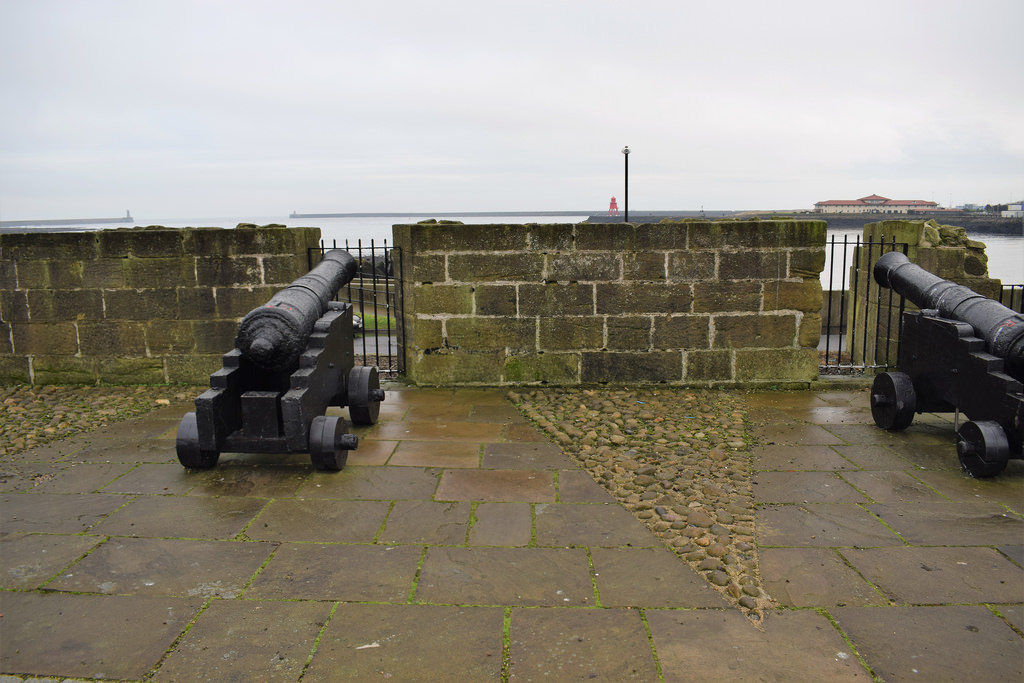
from Flickr (flickr)
Clifford's Fort of 1672, guarding the mouth of the Tyne, North Shields
Pinned by Simon Cotterill
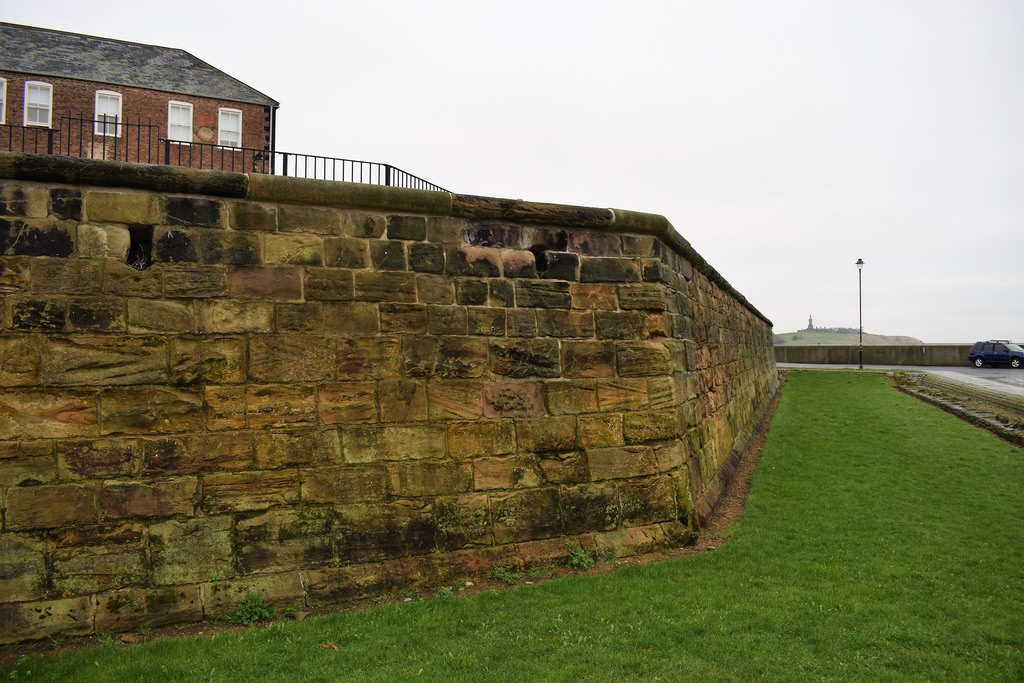
from Flickr (flickr)
Clifford's Fort of 1672, guarding the mouth of the Tyne, North Shields
Pinned by Simon Cotterill

from https://commons.wikimedia.org…
Gun embrasures on the east wall of the fort
- "Clifford's Fort was built in 1672 to defend the River Tyne during the Dutch Wars" Photo by 'Barabbas1312', 20 August 2015. Image licensed under the Creative Commons Attribution-Share Alike 4.0 …
Added by
Simon Cotterill

from https://commons.wikimedia.org…
17th-century west wall with musket ports. A postern to the left originally provided access to the lighthouse.
- "Clifford's Fort was built in 1672 to defend the River Tyne during the Dutch Wars. Fort wall, sandstone ashlar and brick. There was a poster on the left which gave …
Added by
Simon Cotterill

from https://commons.wikimedia.org…
Guns on the fort, looking towards Tynemouth
- "Clifford's Fort was built in 1672 to defend the River Tyne during the Dutch Wars" Photo by 'Barabbas1312', 20 August 2015. Photo licensed under the Creative Commons Attribution-Share Alike 4.0 …
Added by
Simon Cotterill

from https://commons.wikimedia.org…
Buildings on the fort today (left-right): Smokehouses (formerly mine stores), Old Low Light, 'The Barracks' (c.1893) and fishmongers' stalls.
- "Buildings on Clifford's Fort: former smokehouses, Old Low Light, former barracks, fishmongers' stalls." Photo by 'Barabbas1312', 20 August 2015. Photo by licensed under the Creative Commons Attribution-Share Alike 4.0 International …
Added by
Simon Cotterill
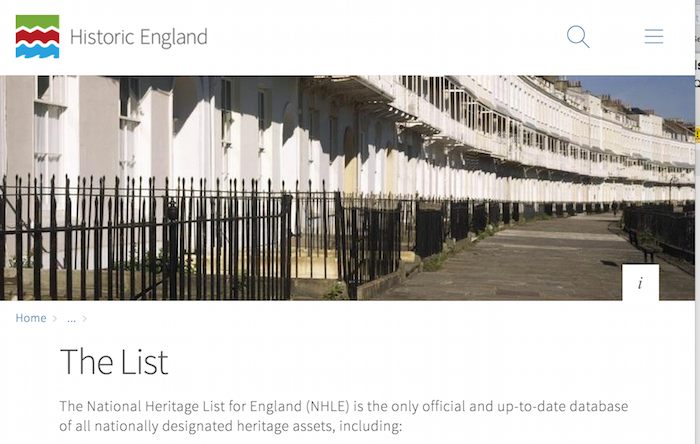
from https://www.historicengland.o…
CLIFFORD'S FORT SOUTH AND EAST WALL FACING RIVER - List Entry
- "Clifford's Fort south and east wall facing river. G.V. II* Fort wall. 1672. Sandstone ashlar. Tapered nosed wall with gun embrasures. Built just before the outbreak of the Dutch War....A …
Added by
Simon Cotterill

from https://www.historicengland.o…
CLIFFORD'S FORT WEST AND SOUTH WEST WALL - List Entry
- "Clifford's Fort west and south west wall. G.V. II* Fort wall, 1672. Sandstone ashlar and brick. Tapered nosed wall; brick upper courses with bricked-up musket holes. Partly obscured by later …
Added by
Simon Cotterill

from https://www.historicengland.o…
BALLARD'S SMOKE HOUSE CLIFFORD'S FORT AND BOUNDARY STONES ATTACHED - List Entry
- "Smoke house, formerly barracks building; 2 military fort boundary stones. Circa 1920 smoke house built on mid C19 military building; mid C19 boundary stones......"
Added by
Simon Cotterill

from https://www.historicengland.o…
CLIFFORD'S FORT TRINITY HOUSE ALMSHOUSES AND BOUNDARY STONE ATTACHED - List Entry
- "Lighthouse, later almshouse. 1727 lighthouse; raised 1775; converted to almshouses 1830; for Trinity House, Newcastle upon Tyne. Brick of varying bonds with quoins at right; ground floor rendered; painted sandstone …
Added by
Simon Cotterill
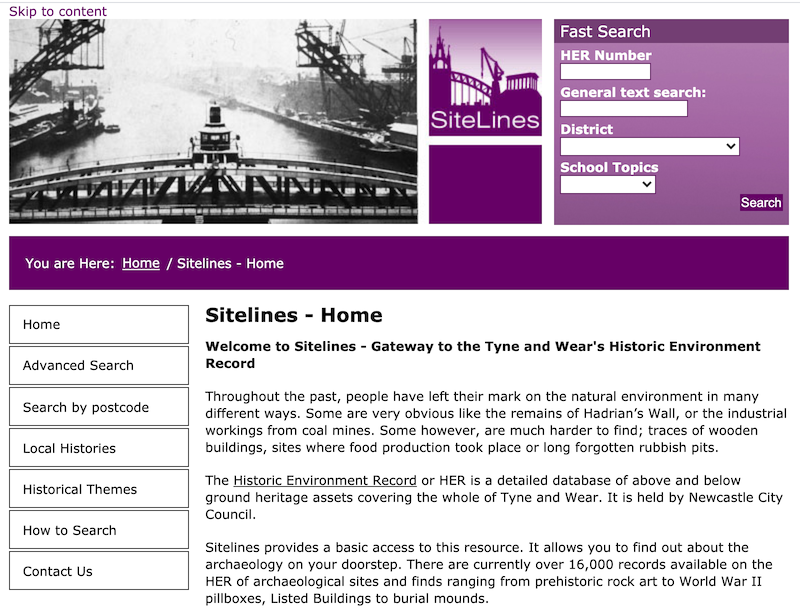
from http://twsitelines.info/SMR/1…
Tyne and Wear HER(149): North Shields, Clifford's Fort, post medieval defences
- "Clifford's Fort was built in 1672, the beginning of the third Dutch War, as a successor to a little fort (c. 1642) of "baskets filled with sand and mortar, with …
Added by
Simon Cotterill

from http://twsitelines.info/SMR/9…
Tyne and Wear HER(9377): North Shields, Clifford's Fort, No. 10 (Old Barrack Building)
- "Brick-built soldiers quarters as shown on OS second edition. Purpose-built structure for the Tyne Divison Royal Engineers (Volunteers) Submarine Miners built circa 1888. Clifford's Fort was at that time a …
Added by
Simon Cotterill

from http://twsitelines.info/SMR/9…
Tyne and Wear HER(9387): North Shields, Clifford's Fort, 7, 7a, 8 and 8a (mine stores)
- "Two former mine stores (Nos. 7 and 8) and two loading rooms (Nos. 7a and 8a) where the detonators for the mines were kept. The four buildings form a square. …
Added by
Simon Cotterill
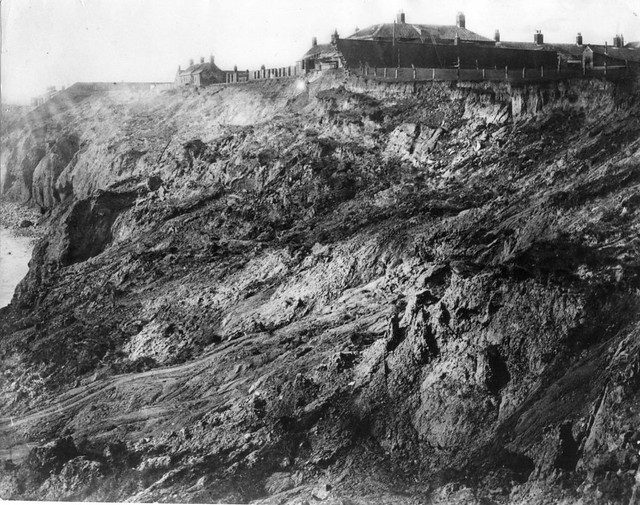
Co-Curate Page
Percy Square Barracks, North Shields
- In 1758 barracks were erected for 1,000 men in North Shields, when there was fear of invasion, during a period of conflict with France over territories in the Americas. The barracks …
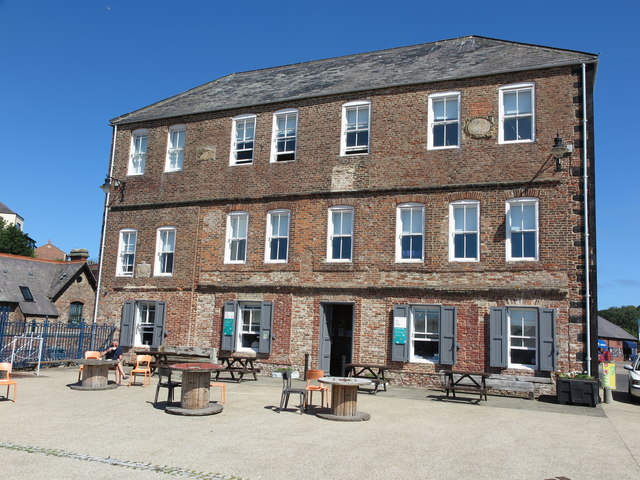
Co-Curate Page
Old Low Light
- Overview Map Street View The Old Low Light is a heritage centre and cafe located at the Fish Quay in North Shields. It was originally built as a lighthouse in …


from Flickr (flickr)
Clifford's Fort of 1672, guarding the mouth of the Tyne, North Shields
Pinned by Simon Cotterill

from Flickr (flickr)
Clifford's Fort of 1672, guarding the mouth of the Tyne, North Shields
Pinned by Simon Cotterill

from https://commons.wikimedia.org…
Gun embrasures on the east wall of the fort
- "Clifford's Fort was built in 1672 to defend the River Tyne during the Dutch Wars" Photo by 'Barabbas1312', 20 August 2015. Image licensed under the Creative Commons Attribution-Share Alike 4.0 …
Added by
Simon Cotterill

from https://commons.wikimedia.org…
17th-century west wall with musket ports. A postern to the left originally provided access to the lighthouse.
- "Clifford's Fort was built in 1672 to defend the River Tyne during the Dutch Wars. Fort wall, sandstone ashlar and brick. There was a poster on the left which gave …
Added by
Simon Cotterill

from https://commons.wikimedia.org…
Guns on the fort, looking towards Tynemouth
- "Clifford's Fort was built in 1672 to defend the River Tyne during the Dutch Wars" Photo by 'Barabbas1312', 20 August 2015. Photo licensed under the Creative Commons Attribution-Share Alike 4.0 …
Added by
Simon Cotterill

from https://commons.wikimedia.org…
Buildings on the fort today (left-right): Smokehouses (formerly mine stores), Old Low Light, 'The Barracks' (c.1893) and fishmongers' stalls.
- "Buildings on Clifford's Fort: former smokehouses, Old Low Light, former barracks, fishmongers' stalls." Photo by 'Barabbas1312', 20 August 2015. Photo by licensed under the Creative Commons Attribution-Share Alike 4.0 International …
Added by
Simon Cotterill

from https://www.historicengland.o…
CLIFFORD'S FORT SOUTH AND EAST WALL FACING RIVER - List Entry
- "Clifford's Fort south and east wall facing river. G.V. II* Fort wall. 1672. Sandstone ashlar. Tapered nosed wall with gun embrasures. Built just before the outbreak of the Dutch War....A …
Added by
Simon Cotterill

from https://www.historicengland.o…
CLIFFORD'S FORT WEST AND SOUTH WEST WALL - List Entry
- "Clifford's Fort west and south west wall. G.V. II* Fort wall, 1672. Sandstone ashlar and brick. Tapered nosed wall; brick upper courses with bricked-up musket holes. Partly obscured by later …
Added by
Simon Cotterill

from https://www.historicengland.o…
BALLARD'S SMOKE HOUSE CLIFFORD'S FORT AND BOUNDARY STONES ATTACHED - List Entry
- "Smoke house, formerly barracks building; 2 military fort boundary stones. Circa 1920 smoke house built on mid C19 military building; mid C19 boundary stones......"
Added by
Simon Cotterill

from https://www.historicengland.o…
CLIFFORD'S FORT TRINITY HOUSE ALMSHOUSES AND BOUNDARY STONE ATTACHED - List Entry
- "Lighthouse, later almshouse. 1727 lighthouse; raised 1775; converted to almshouses 1830; for Trinity House, Newcastle upon Tyne. Brick of varying bonds with quoins at right; ground floor rendered; painted sandstone …
Added by
Simon Cotterill

from http://twsitelines.info/SMR/1…
Tyne and Wear HER(149): North Shields, Clifford's Fort, post medieval defences
- "Clifford's Fort was built in 1672, the beginning of the third Dutch War, as a successor to a little fort (c. 1642) of "baskets filled with sand and mortar, with …
Added by
Simon Cotterill

from http://twsitelines.info/SMR/9…
Tyne and Wear HER(9377): North Shields, Clifford's Fort, No. 10 (Old Barrack Building)
- "Brick-built soldiers quarters as shown on OS second edition. Purpose-built structure for the Tyne Divison Royal Engineers (Volunteers) Submarine Miners built circa 1888. Clifford's Fort was at that time a …
Added by
Simon Cotterill

from http://twsitelines.info/SMR/9…
Tyne and Wear HER(9387): North Shields, Clifford's Fort, 7, 7a, 8 and 8a (mine stores)
- "Two former mine stores (Nos. 7 and 8) and two loading rooms (Nos. 7a and 8a) where the detonators for the mines were kept. The four buildings form a square. …
Added by
Simon Cotterill

Co-Curate Page
Percy Square Barracks, North Shields
- In 1758 barracks were erected for 1,000 men in North Shields, when there was fear of invasion, during a period of conflict with France over territories in the Americas. The barracks …

Co-Curate Page
Old Low Light
- Overview Map Street View The Old Low Light is a heritage centre and cafe located at the Fish Quay in North Shields. It was originally built as a lighthouse in …
Tyne & Wear HER: 149
List grade: 2*
Wikipedia: Clifford's Fort
Post code: NE30 1JE
Borough: North Tyneside
